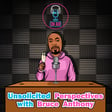
Shattering Illusions: Equity vs Equality, Religion & Marriage
🔥Is ‘equality’ actually unfair? Why do ‘Christian’ policies clash with Jesus’ teachings? And why do men keep failing at marriage? Bruce Anthony breaks down equity vs equality, exposes hypocrisy in modern Christianity, and reveals the real reason marriages crumble. From DEI backlash to Trump’s un-Christian policies, this episode tackles systemic injustice, faith contradictions, and the invisible labor crushing relationships. Perfect for social justice advocates, critical thinkers, and anyone tired of surface-level debates. #EquityVsEquality #ChristianHypocrisy#MarriageAdviceForMen #DEIExplained #marriageadvice #podcast #unsolicitedperspectives
🔔 Hit that subscribe and notification button for weekly content that bridges the past to the future with passion and perspective. Thumbs up if we’re hitting the right notes! Let’s get the conversation rolling—drop a comment and let’s chat about today’s topics.
For the real deal, uncensored and all, swing by our Patreon at patreon.com/unsolicitedperspectives for exclusive episodes and more.
Thank you for tuning into Unsolicited Perspectives with Bruce Anthony. Let's continue the conversation in the comments and remember, stay engaged, stay informed, and always keep an open mind. See you in the next episode!
#podcast #mentalhealth #relationships #currentevents #popculture #fyp #trending #SocialCommentary
Chapters:
0:00 Welcome to Unsolicited Perspectives 🎙️🔥💥
01:13 Equity vs. Equality: Why Fairness Isn’t One-Size-Fits-All 🌱⚖️
02:40 Real-World Showdown: When Equality Doesn’t Cut It 🍎📚
07:04 Myth Busting: Why Equity Isn’t Taking From You 🚫🤔
11:10 Equity at Work, School & Beyond: Who’s Really Benefiting? 🏥💼🏫
14:03 DEI Under Fire: The Hidden Agenda Behind the Backlash 🔥🎯
17:57 Smart or Privileged? Rethinking Intelligence & Education 🧠📚
22:36 Christian or Hypocrite? Are We Living the Values? ✝️❓
26:07 Bible vs. Policy: When Politics Clash with Scripture 📖⚔️
31:29 Conservative Christianity: Love Thy Neighbor or Just Lip Service? 💔🗣️
33:27 The ‘Religious Freedom’ Facade: Who’s Really Protected? 🎭🛡️
34:49 Jesus vs. Politics: The Trump Administration’s Contradictions 🤷♂️✝️
41:16 Love, Laundry & Lessons: Confessions of a Reformed Husband 💑🧺
47:05 Gender Roles at Home: Who’s Really Doing the Work? 👫⚖️
59:28 Closing the Chapter: What We Learned (And Unlearned) 📘🔍
01:01:10 Closing Remarks and Call to Action
Follow the Audio Podcast:
Apple Podcast: https://podcasts.apple.com/us/podcast/unsolicited-perspectives/id1653664166?mt=2&ls=1
Spotify: https://open.spotify.com/show/32BCYx7YltZYsW9gTe9dtd
www.unsolictedperspectives.com
Beat Provided By https://freebeats.io
Produced By White Hot
